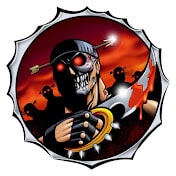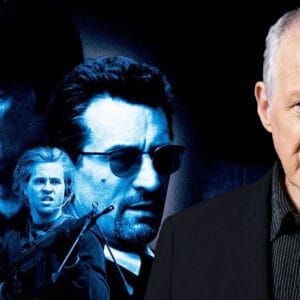
Michael Mann is probably the only director who has a catalogue of films that I love across the board. While they each of course have their own issues and certain elements which don’t quite work as well in execution as Mann surely meant them to, I nonetheless hold his catalogue as a whole in a much higher regard than I do almost any other director working today. I used my very first entry in this column to express my love for MIAMI VICE, and there are even ways in which I have found the well-intentioned-but-ultimately-misguided PUBLIC ENEMIES redeems itself.
Not so much with HEAT. Probably Mann’s most well known film, and most well regarded besides, it is an exploration of the “cops and robbers” dynamic in a way rarely seen before but much copied since – the boring, dragging, yet painfully stilted way, to be precise. I’ve watched HEAT twice now, and while I’m currently halfway through a third viewing I just can’t seem to find the willpower to finish. The disc has been sitting by my Playstation for weeks now, watching dolefully as I pop in one disc after another and slowly manage to move on with my life.

I understand that the story at the heart of HEAT is inspired by a real relationship between a man of the law and a criminal. I understand that it is fully intended to be a slow burn balancing act between action and the examination of character. And I understand that it is, in the context of its time, hailed as a reinvention (and consequently a reinvigoration) of the action/crime film. But knowing these to be so doesn’t mean that I think it works, nor does it meant that I like it. And as you might have surmised by now, I really don’t. And before you get your innards in a bunch – no, I’m not speaking insincerely. I do believe what I say, sad as it may be.
To my mind, a great deal of the feeling that plagues the film can be summed up in the iconic diner scene between Pacino and De Niro. The story goes that De Niro and Pacino didn’t actually meet on the set of HEAT until the time came to film said scene. There wasn’t even a lick of technical rehearsal with the actors on the day of the shoot – they just showed up, Mann set the cameras, and off they went. De Niro believed that this… lack of familiarity with each other would inform the scene, enhancing element about the confrontation which were already written into the script. The end result? A scene that feels so technical and stilted as to be distracting. Two characters interacting in a mechanically dissociated way, so wary of each other that their energy halts mid-table never meets that of the other.
So too can be described the film as a whole, with shots drawn out longer than is necessary and an emphasis on technical execution that stoppers whatever flow the actors and story are constantly struggling to achieve. Normally I am a strong advocate for the power of small moments to elevate a film’s greater character/story arc, but in HEAT’s case I find they do little more than to provide a rest stop on the way to the final destination. Except I don’t always want that sort of a forced rest stop, and they often seem to arrive just when they are least desired. Even Mann’s trademark visual sense and normally sharp eye for the cohesion of color and composition fails in the course of this film, immersing us in a washed out Los Angeles that has about as much personality and presence as a whitewashed garage.

Perhaps it is on the script level that HEAT falls short, many of the more famous encounters and exchanges behind improvised in the moment and thereby standing out from an otherwise poorly-constructed script that meanders slowly enough for the dust of lost possibility to settle in coating an inch thick. The dialogue and character encounters lack the spark Mann had managed to achieve even in early films like MANHUNTER, and looking back on the film I can barely recall what even happened over the course of its many (many [many]) minutes. Or, for that matter, how it happened.
At the end of the day, maybe my opinion of this being one of Mann’s worst films springs from a place of hindsight rather than true belief. Most of his cinematic output came post-HEAT, a time during which he was able to further explore and perfect his craft. And I fundamentally think that HEAT just doesn’t hold up beyond a fascinating illustration of an excellent director’s origin. So it served a purpose, and I respect and thank it for that purpose, but part of the mark of a film as seemingly well-regarded as HEAT is its ability to withstand the test of time by maintaining its relevance, resonance, and level of energetic engagement. And by my examination through such a barometer, HEAT is far from the pedestal on which history has elected to place it.



































Follow the JOBLO MOVIE NETWORK
Follow us on YOUTUBE
Follow ARROW IN THE HEAD
Follow AITH on YOUTUBE